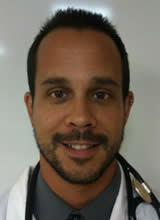
“Doctor, the patient’s potassium is 3.7,” a nurse says to me over the phone at 4 in the morning.
“And?” I ask, exhausted but always unable to sleep in the hospital.
“He needs to be given potassium,” she says with genuine concern in her voice.
“The normal range is 3.5 to 5.0. I think he’ll be okay,” I say as calmly as I can. I have a half- dozen conversations with nurses every night about potassium levels. A five-minute conversation about the risks and benefits of potassium usually follows, and I end up exasperated. In Boston, the nurses enforce a dogma that has no basis in scientific evidence but is merely cultural practice in the hospital where I work. I’m upset that in Boston we can focus on trivial details like potassium while patients in Rwanda die of simple diarrheal illnesses. I fight the battle with nurses every night I work, irrationally raging against a larger system by focusing on the minutia that I can control.
Part of the problem is that I just don’t like the way medicine is practiced in America, and that may be why I left for Rwanda in the first place. In the United States, we waste too many resources, and the patient care is no better for all the extra expense. Too many tests are ordered that serve no purpose and can actually cause the patient real harm. But my well-intended colleagues want a CAT scan, “just to be sure” — ignoring the cost, the radiation the patient receives, or the real chance that a false positive test leads to further invasive testing. Patients don’t understand the harm in over-testing, and often demand higher level testing as well.
In American medicine, every symptom is seen as something that needs to be acknowledged, addressed, and solved. Drug company commercials have created an entire society of hypochondriacs and over-worriers, myself included. Often, the patient isn’t the one complaining about the symptom — the nurse, wife or other family member feels obligated to let the medical team know about every minor discomfort. They may feel that the information might help the team diagnose and treat the patient, or they may feel uncomfortable watching the patient be less than perfectly comfortable. Patients in Rwanda walk around with pain or a massive tumor on their face, and even then they hesitate to complain.
The computer system is designed to prevent medical errors, but it ends up preventing staff from performing their patient-care duties. The system constantly reminds us: “Warning! Are you sure you want to order that medication?” “Warning! The patient is allergic to aspirin. The allergy is upset stomach. Are you sure you want to give aspirin?” I click through the barrage of warnings and reminders merely to be permitted to give a patient suffering from a heart attack an aspirin. Some amount of checks and balances would certainly improve care in Rwanda, but the level in Boston is suffocating to staff and patients.
The system is terribly broken and needs any number of solutions that are politically unpalatable to the right and the left. Universal health insurance, medical malpractice reform, capping of insurance and pharmaceutical company profits (socialist!), elimination of the commoditization of healthcare, and containment of spending through (gasp!) rationing of healthcare based on scientific evidence of a treatment’s cost-effectiveness and not politics. For the record, Rwanda has universal health insurance for basic care provided by the government, but higher order care is rationed by the patient’s ability to pay.
The absurd contrast between my job in Boston and the situation in Rwanda eats at me for the entire month that I am home. I don’t know how to communicate to the nurse concerned with a normal potassium that three days earlier I was watching a previously healthy 24-year-old woman die of pneumonia. I can’t explain to her that many patients in Rwanda die because we lack inexpensive medications. Or that their children die at home because their parents are too poor to pay for a bicycle ride to the health center. I care for children dying of malnutrition in Rwanda, and for 300-hundred-pound Americans who are on expensive, artificial nutrition through an IV to “maintain their nutritional status while in the hospital.”
When American patients complain of pain or nausea despite receiving several medications, I quietly give them yet another drug, and I don’t tell them that we often don’t have any morphine in Rwanda and that many patients die in tremendous pain. I can’t tell the nurse that I am angry because her phone call reminded me of the tremendous incongruity of resources between the two places I work. I don’t want to burden her with those details, but appreciate that she has the patient’s best interest at heart. So I write the order to give a patient with normal potassium some more potassium, and hope that we will soon have genuine discussions about how to repair the system.
Vincent DeGennaro is an internal medicine doctor and a global public health specialist in the Department of Global Health and Social Medicine, Harvard Medical School. He also works with the international nonprofit organization Partners in Health. See his An American Doctor in Rwanda blogs.